Moderator Christopher Irving braced himself for a storm of strong personalities talking about their experiences pushing the boundaries of humor in comics, further complicated by the face that there were a gaggle of young teens in attendance to remind creators to try to put a lid on the almost unavoidable profanity that was bound to emerge. Frank Cho (LIBERTY MEADOWS, SAVAGE WOLVERINE), Evan Dorkin (MILK ‘N’ CHEESE, BEASTS OF BURDEN), Tim Rickard (BREWSTER ROCKIT), and Peter Bagge (HATE!) took up their positions to shock and amuse, but what emerged was plenty of dialogue on their all too serious struggles with the status quo. Bagge kicked things off by explaining that he was sharing a table with Dorkin this year and hearing his endless kvetching about the state of the comics industry was making him want to kill himself. Dorkin seized and edited Irving’s introduction notes before allowing things to proceed and Cho, who had been ill, bravely took his seat, only to be handed a note from a young lady working at the con explaining that “Frank Cho went home early”. This was pretty much the kind of craziness that the audience was expecting from such an esteemed line-up.
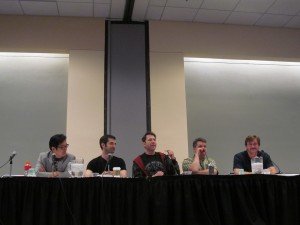
The panellists hadn’t had much more luck with retail comic shops, either, having to go into “dark corners” to find humor comics to begin with, and Dorkin cited that only 10% of shops had ever carried his works. Dorkin’s most surprising experience with backlash came from doing a “back page strip” in a Jewish themed magazine of Jews baking with the blood of Christian children (an all too real medieval anti-semitic belief in Europe) that he didn’t realize would be published online before it saw print. Once on the web, “Nazi hate groups” started putting up the comic, despite the fact that the comic was about “ridiculous beliefs taken to a ridiculous extreme”. Dorkin received death threats and hate mail for the strip, with fans calling the house and declaring a boycott on his work. For Dorkin, whose motto is “Don’t back away from a strip”, this was nevertheless the “only time I’ve ever been scared”. The problem, he said, is that some people don’t read humor comics closely enough to benefit from what they are actually saying about life, and that leads to extreme responses.
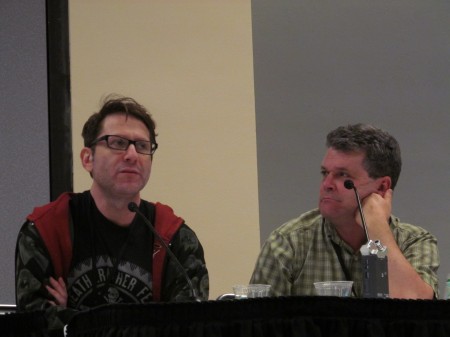
When asked if they can laugh about their disturbing experiences given enough time to gain perspective, Bagge said that now that he’s finally “making wages” through comics, “the years of poverty are suddenly funny”. And now that it’s funny, he’s prepared to use that material in his comics, though it’s still “irksome” to him. Dorkin, too, has put some of his worst experiences in his life into comics, for instance his “depression, anxiety problems, not getting works done, stuff with parents”, but he changes them to make them funnier since at heart they are “serious issues”. He’s had so many other cartoonists write to him to admit that they’ve had similar problems that he could carry out an effective blackmail campaign, he warned.
It came out in the panel that Cho and Dorkin had a professional connection, since Dorkin almost gave Cho his first job in comics. In 1995 or 96, Cho said he met Dorking at Small Press Expo and they began talking about doing a series together (one that never happened, actually), but it led to a tryout with Dark Horse. The tryout went badly for Cho because he was in finals week at college and his work wasn’t up to snuff, so he was never hired. Nevertheless, this false start led him to think of Dorkin as an early pro influence. “I went onto fame and fortune as a slob, you’re wearing a suit”, Dorkin commented, also insisting enigmatically that he was wearing stolen clothes. Cho did look dapper despite the fact that he was under the weather.
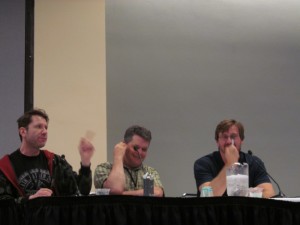
When they were asked what projects they had coming up, Cho hinted at some unannounced Marvel projects, as well as a HOW TO DRAW SEXY WOMEN Kickstarter art book, and also three creator owned projects underway “at various stages”. Creator-owned may indeed be the way to go when it comes to censorship, given the stories the panellists shared. Dorkin has some things coming up that he also can’t talk about yet concerning comics, but a new BEASTS OF BURDEN series is also on the way, as well as a HOUSE OF FUN comic at Dark Horse and some animation work. He’s working on “other people’s stuff” too, he said, stuff that’s “famous”, but he couldn’t comment further. Bagge’s biographical book on Margaret Sanger is coming out shortly, a pioneer of birth control who led a “wild, crazy life” herself. He promises it will be quite a “page turner”. Rickard concluded the panel with signature dark humor and world-weary observations. “I have been promoted to night-manager at Burger King”, he said, and he will also be continuing his satirical syndicated strip BREWSTER ROCKIT, and will also producing a syndicated e-book very soon.
Cho, Dorkin, Bagge, and Rickard’s examples proved that there are plenty of un-funny moments for any comics artist working with humor and satire, but it’s some of the bravest work in comics consequently, and for these guys it’s certainly a matter of never “backing away from a strip” they believe in.
Hannah Means-Shannon writes and blogs about comics for TRIP CITY and Sequart.org and is currently working on books about Neil Gaiman and Alan Moore for Sequart. She is @hannahmenzies on Twitter and hannahmenziesblog on WordPress. Find her bio here.



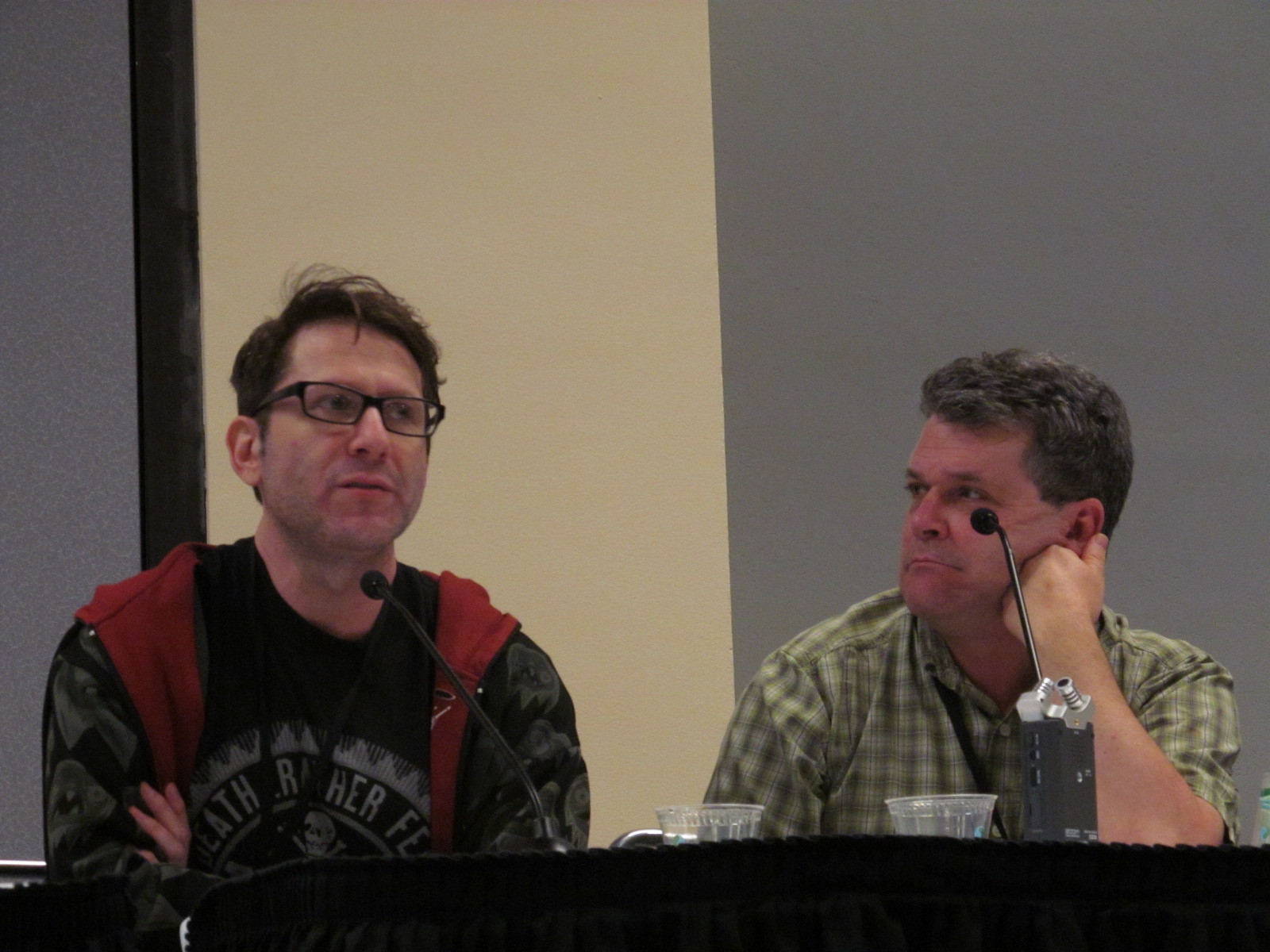
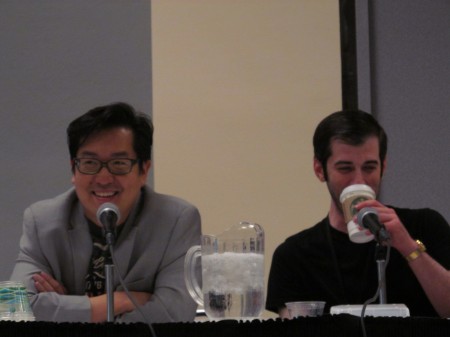







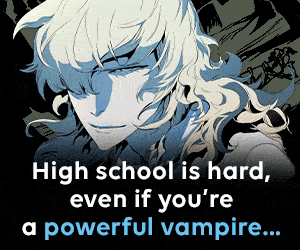

Eltingville.
Hannah, your panel recaps are always a delight.
Is there any chance a video of this panel discussion exists?
Jacob- thank you so much. Encouragement makes a big difference to me- I appreciate it.
Bottle: Chris Irving made a high quality audio recording…
Jacob, I agree.
I’m really enjoying Hannah’s recaps. She knows how to take notes. I like her coverage.
My pleasure. You tend to cover panels I would have liked to have attended, and you do it with a style that is both easy to read, conversational, and packed with information.
Comments are closed.